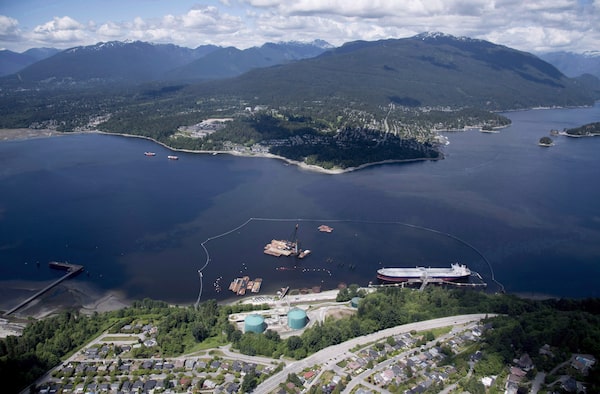
A aerial view of Kinder Morgan's Trans Mountain marine terminal, in Burnaby, B.C., is shown on Tuesday, May 29, 2018.JONATHAN HAYWARD/The Canadian Press
An international environmental group wants the National Energy Board to expand its review of the Trans Mountain pipeline expansion to include its full impact on greenhouse gas emissions.
Lawyers for Stand.earth on Monday filed a legal motion asking the board to look at the full impact on greenhouse gas emissions from expanding the pipeline, which runs between the Alberta oil sands and the Vancouver-area city of Burnaby. They cite the emissions that occur from the extracting of the crude that goes into the pipeline, from processing it in refineries and from its use in vehicles and industry.
Tuesday is the deadline for intervenors to make submissions to the board, which will reply by Jan. 25 and is to submit a final report to the federal cabinet on Feb. 22. The government bought the pipeline last year, hoping to get the project completed.
Casey Leggett, a lawyer for Stand.earth, told a news conference in Vancouver the legal motion is based on the board’s review of Energy East, TransCanada Corp.’s proposed pipeline to the East Coast. In that case, the NEB indicated it was considering a full climate assessment of the now-abandoned, $15.7-billion project.
That caused consternation in the industry, and Alberta Premier Rachel Notley vehemently opposed any suggestion that such indirect effects should be considered.
“It would be completely arbitrary and unreasonable, in fact unprincipled, not to take the same stance with respect to the Trans Mountain expansion project,” Mr. Leggett said. “We’re hoping and cautiously optimistic that the National Energy Board will do the right thing and accept further submissions and evidence on the impacts the project will have on greenhouse gas emissions and on climate change.”
In the motion from Stand.earth, which has offices in Vancouver and San Francisco, Mr. Leggett writes: "The catastrophic impacts of climate change are already bearing down on us with a ferocity that has never been witnessed before. The board cannot possibly fulfill its mandate of determining whether the project is in the public interest without considering whether the project is reconcilable with Canada’s international obligations to substantially reduce [greenhouse gas] emissions.”
On Monday, Tzeporah Berman, international program director for Stand.earth, said the battle against Trans Mountain will not end if the board rejects the appeal, and that curbing emissions from the oil and gas sector is key to dealing with climate change.
“There is no question that there will be further legal battles ahead should the National Energy Board recommend approval of this project and the Trudeau government approve the expansion,” she told the news conference.
James Stevenson, a spokesman for the board, said on Monday that it had not yet received Stand.earth’s application. “When the NEB receives the motion, it will be reviewed and the board will issue further direction to the parties in the reconsideration,” he said.
The federal government directed the NEB to reconsider the effects that shipping related to the project would have on marine life, rather than a full slate of issues. Vanessa Adams, spokeswoman for Natural Resources Minister Amarjeet Sohi, said in an e-mail on Monday that in doing so, the government is following a ruling by the Federal Court of Appeal, which last August quashed Ottawa’s permit for the project.
In reference to Stand.Earth’s arguments about Energy East, Ms. Adams said Ottawa committed to the same format that it used for other projects, Trans Mountain among them, which included an assessment of the emissions from extraction, but not an analysis of how it would affect greenhouse gas emissions in the broader energy marketplace.
On Energy East, the NEB issued a draft list of issues it might consider. TransCanada withdrew its application before the board determined whether to pursue that broader assessment.
The federal government did review the expected impact on emissions of TransMountain in Alberta from the production of the oil. It said the project would not necessarily cause additional emissions, because it might simply carry oil that would otherwise be shipped by rail.